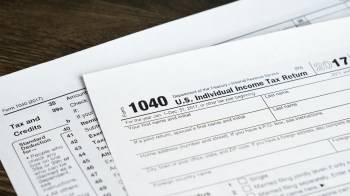
The history — and psychology — behind the tax refund
The history — and psychology — behind the tax refund

ATC Income Tax, based in Georgia, is out with a new ad this tax season.
In it, three couples are sitting around a dinner table. And they’re bragging about their tax refunds.
When I showed the ad to Justin McAuliffe, a CPA in Bellmore, New York, he sighed. Heavily.
“Refunds aren’t cool,” McAuliffe said. “That’s your money. They’re making this seem that a refund is something magical.”
As McAuliffe is constantly telling his clients, and anyone else who’ll listen: a refund is just money you overpaid in taxes. It is an interest-free loan to the government — one you can avoid by changing the amount your employer withholds from your paycheck.
But for the multibillion-dollar tax preparation industry, the tax refund is a selling point.
“We’re letting our clients walk away thinking that we’re great because of the refund we get them,” McAuliffe said. “It’s bull. It’s garbage.”
We are now several weeks into the first tax filing season under the 2017 tax overhaul law, and there’s word from the IRS that tax refunds are smaller than last year. The average refund is down by almost 9 percent, and the number of people getting refunds has fallen too.
You might think that means people are paying more in taxes. In fact, the opposite is true. According to the Tax Policy Center, most people actually got a tax cut under the new law. But they got that tax cut all year long, in the form of higher paychecks.
And yet, a lot of taxpayers are outraged at the news. They’ve gotten attached to their refunds.

Sheet music for Irving Berlin’s 1942 song “I Paid My Income Tax Today.”
How did we get here?
We’ll start in the early 1940s. The U.S. had just entered World War II, and the government needed money to fund the war effort. Congress decided to expand the income tax. No longer was it just for the really rich.
The IRS even commissioned Irving Berlin to write a song reminding people that paying taxes was their patriotic duty (click here to view the full sheet music).
The government couldn’t bank on patriotism alone, so it created withholding. Employers started deducting taxes from workers’ paychecks and sending that money to the government.
But the math was tricky. And by the late ’40s, the government was giving back about $2 billion to taxpayers a year. The tax refund was born. Along with it came a huge marketing opportunity.

An advertisement for Ruppert Motors in the Covina Argus Citizen on Apr. 3, 1953.

“We Couldn’t Help You Figure Your INCOME TAX . . . but we have some GREAT SUGGESTIONS on how to spend your TAX REFUND!” advertised Don’s TV in the Corona Daily Independent on Apr. 20, 1967.
Back then, Ed Garten’s grandfather owned a car dealership in Hinton, West Virginia. Like a lot of car dealers, he was always coming up with gimmicks to get people in the door.
“He actually gave away two ponies to two little girls, you know, who dragged their fathers in to look at the new ’57 Ford,” Garten said.
Garten, who’s an auto historian, says the tax refund became yet another way to sell cars.
“Dealerships were savvy, and they were essentially saying, ‘we know you’ve got money coming to you soon, going to be jingling in your pocket. You probably need a new car. You know, come on in and let’s talk,’” he said.
By the ’60s, all kinds of businesses were trying to cash in on refund season.
Come spend your refund on a new couch. Or a color TV. Or a side of beef, just 67 cents a pound.

An advertisement for Furniture Gallery, Inc. in the Silver City Daily Press on March 18, 1970.
Along the way, refunds became a part of our lives. We started to expect them. Last year, taxpayers got back more than $320 billion.
“I’ve yet to see anything that will dissuade taxpayers from wanting and demanding a significant refund,” said David Williams, chief tax officer at Intuit, which makes the tax preparation software TurboTax. “No amount of financial advice seems to have turned the tide on it.”
“It’s like a birthday present you know? Somebody sent you money!” said Rachel Davies, who lives in Virginia. And yes, she knows the refund is her own money. But like nearly three-quarters of taxpayers, she and her husband are happy to have the government hold onto that money for them. They get back a few thousand dollars every year.
“I know it’s not the best practice, and so it’s hard to admit,” Davies said. “But I’m not very disciplined with the money that’s in the checking account.”
Over the years, the Davies have used their refund to buy new tires and season passes to an amusement park. But they just did their taxes, and it turns out they won’t get a refund this year. In fact, they owe money.
There’s a lot happening in the world. Through it all, Marketplace is here for you.
You rely on Marketplace to break down the world’s events and tell you how it affects you in a fact-based, approachable way. We rely on your financial support to keep making that possible.
Your donation today powers the independent journalism that you rely on. For just $5/month, you can help sustain Marketplace so we can keep reporting on the things that matter to you.


















